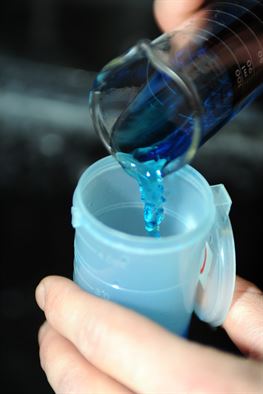 The nonprofit watchdog Environmental Working Group recently released a database that compiled publicly available information from water testing programs at more than 50,000 water utility operators across the country from 2010-2015. Its premise is that people have the right to know what contaminants have been detected in their water, but it has also broached a debate about the acceptable standards for the presence of these contaminants in a drinking water supply.
The nonprofit watchdog Environmental Working Group recently released a database that compiled publicly available information from water testing programs at more than 50,000 water utility operators across the country from 2010-2015. Its premise is that people have the right to know what contaminants have been detected in their water, but it has also broached a debate about the acceptable standards for the presence of these contaminants in a drinking water supply.
Charles Haas, PhD, LD Betz Professor of Environmental Engineering and head of the Civil, Architectural and Environmental Engineering Department in the College of Engineering, who is a renowned expert in assessing health risks associated with chemical and biological agents in water, weighed in on the EWG database in a Bucks County Courier Times story. Haas notes that more publicly available data is a good thing, but he suggests that the data must be interpreted through the lens of the research that was used to set the standards.
“The big issue is that you can never get to zero (health) risk,” said Charles Haas, the Betz Professor of Environmental Engineering at Drexel University. “The challenge is what level do you set that's adequately protective of public health and can be met in an affordable manner?”
Haas said the environmental working group does a “good job of highlighting area of science where we really need to know more information,” particularly for unregulated chemicals. But he offers that “as long as the water authorities are in compliance with federal and state standards, there's not reason to fear or panic.”
Below, Haas acknowledges that the EWG report is likely to raise questions and concerns for many people, especially in the aftermath of the lead contamination problems that drew attention to Flint, Michigan in the past few years. But if this concern translates into greater vigilance and monitoring of polluters, it could have a much greater impact.
What is the best way for people to use this data from the EWG?
If you have questions about the quality of your water based on the EWG report, the best route is to contact your individual water department.
How can people make sure their local water authorities are in compliance with federal and state standards?
All community water supplies are required to send out a “consumer confidence report” (CCR) annually which describes their water quality and their compliance. Reviewing this is the best action. There is a convenient US EPA search tool on line to get your current CCR if you no longer have it: https://ofmpub.epa.gov/apex/safewater/f?p=136:102::::::
How does making data like this available to the public help or hurt the push for adequate standards, monitoring and enforcement that is already in place to ensure our drinking water is safe?
Many water quality problems result from contamination of the watersheds or groundwater tables that the drinking water utilities use for supply. It is always better to control pollution at the source, and therefore working to enact and enforce stricter watershed protection programs is important.